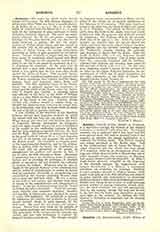

Aumbry, variously written AMBRY, or AUMBRYE, is a derivative through the French of the classical armarium, or medieval Latin almarium. Its original meaning was a cupboard and it has never lost this more general sense, but even in classical Latin it had acquired in addition the special signification of a cupboard for holding books. This limited meaning was widely prevalent in the Middle Ages. Thus in the tenth-century rule of Cluny the library is called armarium and the official who had charge of it armarius, while by an arrangement which was long and widely observed both in Benedictine and in other monastic houses, this armarius, or librarian, was usually identical with the precentor. In Aelfric‘s Anglo-Saxon glossary, compiled at the beginning of the eleventh century, the Anglo-Saxon word bochord (book-hoard, i.e. library), is interpreted bibliotheca vel armarium vel archivum. Similarly it was a common proverb in religious houses, which meets us as early as 1170, that claustrum sine armario est quasi castrum sine armamentario (a monastery without a library is like a fortress without an arsenal). Besides this, owing to the number of cupboards and presses needed for storing vestments, church plate, etc., the word armarium was also not unfrequently used for the sacristy, though this may also be due to the fact that the books were themselves in many cases kept in the sacristy. In German the word Almerei, a derivative of armarium, has the meaning of sacristy.
HERBERT THURSTON

